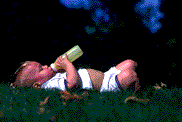|

1. Now that your baby is more active, parents
need to be more careful than ever not to leave the child anyplace from which he of she can fall. Always keep one hand on the
baby and never turn your back, for even a second, when you put your infant on a sofa, bed, changing table or any other high
place. Your baby demands your full attention.
2. Continue to use an infant car seat that is properly secured at all
times.
3. Continue to put your baby to sleep on his back or side; remind relatives and child care providers to do
the same. For healthy babies, back sleeping is preferred and reduces the risk of sudden infant death syndrome (SIDS).
4.
If your home uses gas appliances, install and maintain carbon monoxide detectors.
5. Continue to keep the baby's environment
free of smoke.
6. Keep the home and car nonsmoking zones.
7. Do not drink hot liquids or smoke while holding
the baby.
8. Do not use soft bedding (blankets, quilts, pillows), soft toys, or toys with loops or string cords.
9.
Remember, everything a 4-month holds goes in his or her mouth, so keep toys with small parts out of reach. Warn siblings to
keep these objects away from their little baby brother or sister.
10. Keep all poisonous substances, medicines, cleaning
agents, health and beauty aids, and paints and paint solvents locked in a safe place out of your baby's sight and reach.
11.
Check your home for lead poisoning hazards (e.g., chipped lead paint, lead dust, lead water pipes, poorly glazed pottery).
12. Do not give your baby plastic bags or latex balloons.
13. Use safety locks on cabinets.
14. Wash
your hands and your baby's hands, especially after diaper changes and before feedings. Clean your baby's toys with soap and
water.
15. Do not use an infant walker at any age. The walkers are dangerous and do not help your baby's motor development.
For more information visit:
Town and Country Pediatrics!
Bright Futures.Org: 0 to 11 months
|

